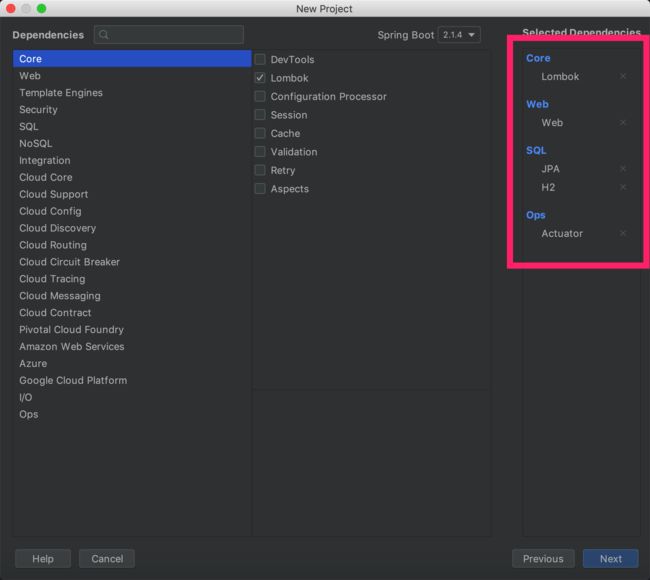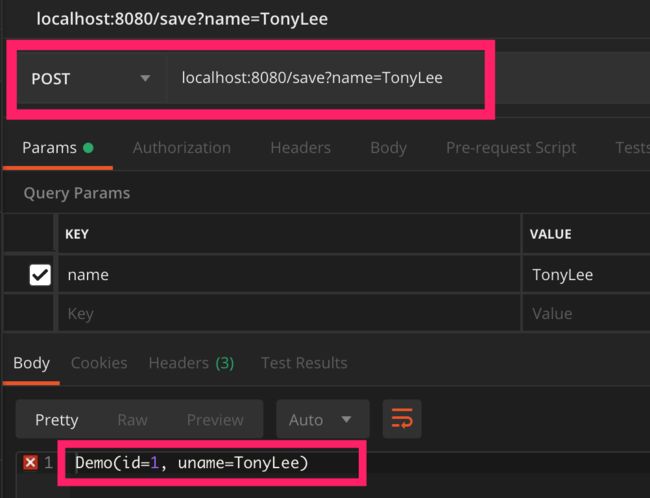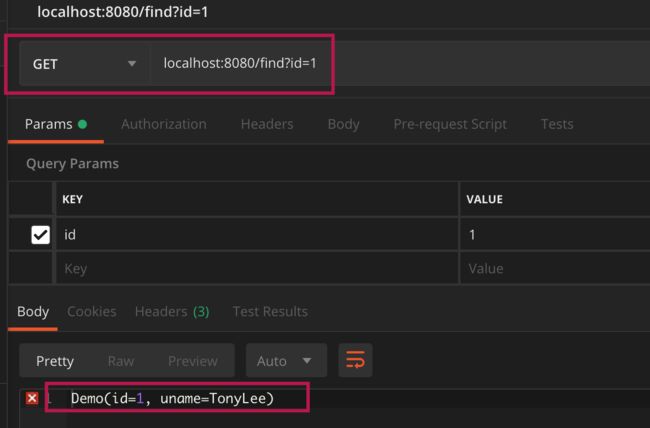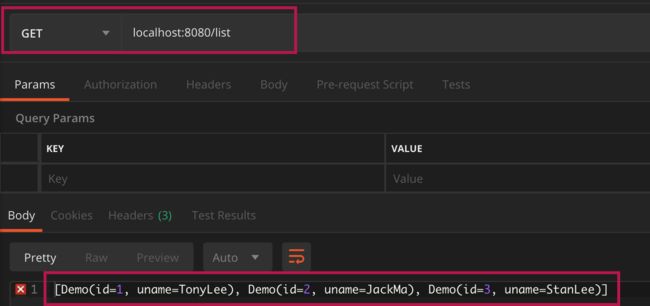1. Spring Boot简介
初次接触Spring的时候,我感觉这是一个很难接触的框架,因为其庞杂的配置文件,我最不喜欢的就是xml文件,这种文件的可读性很不好。所以很久以来我的Spring学习都是出于停滞状态的。
不过这种状态在我接触了Spring Boot之后,就发生了改变。Spring官方可能也觉得庞杂的配置是一件很不优雅的事情,虽然加入了包扫描,但是也没有触及灵魂。
Spring还有一个问题就是依赖的冲突问题,这个对我这种半道出家的程序员来说更是痛苦至极。
还好,所有的痛苦都被Spring Boot终结了。
Spring Boot有三个特点:
- 自动配置
- 起步依赖
- Actuator对运行状态的监控
每一个特点都那么的美好。
其实开发人员的本职工作是什么?是完成业务代码的编写,实现业务功能,因此如果消耗大量时间在Spring本身的配置和依赖冲突解决上,那么等于是浪费了大量的时间。
Spring Boot的出现,可以说是对生产力的一次解放。
闲话少叙,看一个需求。
我现在想要写一个工具,连接数据库,实现增删改查功能,恐怕很多程序员会回忆起最初学习Java的时候,那堪称ugly的JDBC模板代码了吧。我本身是一个DBA,因为公司安排,写过很多JDBC代码,深刻的感觉到这种代码实在浪费时间,后来接触了JPA框架,感觉非常好。下面就用Spring Boot来实现一个数据库的增删改查功能。
2. Spring Boot实战JPA
数据库我会使用H2,这种嵌入式的数据库最适合在家学习的时候使用,很小,支持最基本的数据库操作,只要不涉及到太深刻的内容,感觉和MySQL差不多。至于如何在本机上启动一个H2 Server,就不在这里描述了。
首先呢,打开IDEA,遵循下面的顺序:
new Project ->Spring Initializr ->填写group、artifact ->钩上web(开启web功能)->点下一步就行了。
上图是我选择的需要的组件。
既然是JPA,那么我们首先要定义一个Entity,我的表叫做Demo,那么Entity也就是叫做Demo:
package com.example.springwithjdbc.entity;
import lombok.Data;
import javax.persistence.Entity;
import javax.persistence.GeneratedValue;
import javax.persistence.Id;
@Entity
@Data
public class Demo {
@Id
@GeneratedValue
private int id;
private String uname;
}
注解解释:
- @Entity:表示这个类是个Entity;
- @Data:这是lombok提供的功能,这个注解加上之后,就不需要写getter和setter了,也不用写toString方法,都会自动生成;
- @Id:表示这个是主键;
- @GeneratedValue:表示采用自增
接下来,需要经典的DAO层出现了:
package com.example.springwithjdbc.dao;
import com.example.springwithjdbc.entity.Demo;
import org.springframework.data.jpa.repository.JpaRepository;
public interface DemoDao extends JpaRepository { }
DAO层只是定义了一个interface,没有进行任何实现,其实也不需要进行任何具体的实现,注意继承的JpaRepository,它帮我们做了很多需要我们原先手动编码的工作。
接下来就是经典的Service层了,Service即业务层:
package com.example.springwithjdbc.service;
import com.example.springwithjdbc.entity.Demo;
import java.util.List;
public interface IDemoService {
Demo add(Demo demo);
Demo findById(int id);
List findAll();
}
以上代码是service的接口,接下来编写具体的实现:
package com.example.springwithjdbc.service;
import com.example.springwithjdbc.dao.DemoDao;
import com.example.springwithjdbc.entity.Demo;
import org.springframework.beans.factory.annotation.Autowired;
import org.springframework.stereotype.Service;
import java.util.List;
@Service
public class DemoService implements IDemoService {
@Autowired
private DemoDao demoDao;
@Override
public Demo add(Demo demo) {
return demoDao.save(demo);
}
@Override
public Demo findById(int id) {
return demoDao.findById(id).get();
}
@Override
public List findAll() {
return demoDao.findAll();
}
}
注解解释:
@Service:表示这是一个Service;
@Autowired:将DemoDao注入。
接下来,我们需要一个Controller来实现REST接口:
package com.example.springwithjdbc.controller;
import com.example.springwithjdbc.entity.Demo;
import com.example.springwithjdbc.service.IDemoService;
import org.springframework.beans.factory.annotation.Autowired;
import org.springframework.web.bind.annotation.GetMapping;
import org.springframework.web.bind.annotation.PostMapping;
import org.springframework.web.bind.annotation.RequestMapping;
import org.springframework.web.bind.annotation.RequestParam;
import org.springframework.web.bind.annotation.RestController;
import java.util.List;
@RestController
@RequestMapping("/")
public class DemoRestController {
@Autowired
IDemoService demoService;
@PostMapping("/save")
public String save(@RequestParam(name = "name")String name) {
Demo demo = new Demo();
demo.setUname(name);
return demoService.add(demo).toString();
}
@GetMapping("/find")
public String findById(@RequestParam(name = "id")int id) {
return demoService.findById(id).toString();
}
@GetMapping("/list")
public String findAll() {
List demoList = demoService.findAll();
return demoList.toString();
}
}
最后,配置application.yml,配置数据源:
spring:
datasource:
url: jdbc:h2:tcp://localhost/~/code/h2/bin/demo
username: admin
password: admin
jpa:
show-sql: true
启动这个工程即可,接下来就可以用浏览器或者postman进行测试了,这是我用postman进行的测试,首先发送一个POST请求,写入一条数据:
下面我们查询这条数据:
多写几条数据以后,调用list接口:
到这里,我们已经成功的编写了一段基于Spring Boot的JPA代码,实现了简单的新增和查询功能。比我之前写的JDBC代码不知道简单到哪里去了,而且也更加的优雅了,再也没有那么多复杂的让人难以看懂的xml配置了。
Spring甚至贴心到做了一个网站专门生成工程骨架。
3. 小结
我最近在学习微服务,要学习微服务绕不开的就是Spring Cloud,而Spring Cloud离不开Spring Boot。因此首先了解Spring Boot是很有必要的。
这是我的笔记整理出来的第一篇,希望能够帮助到其他和我一样在学习微服务,学习Spring Cloud,学习Spring Boot的人。



